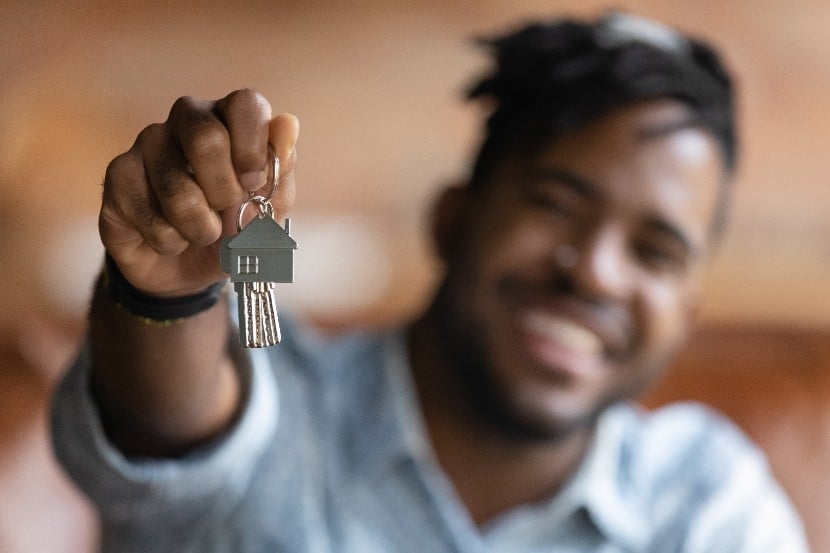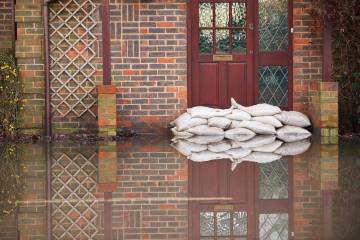Here we give you a step-by-step guide to buying your first home.
This guide takes a look at saving for a deposit, how to start your house search and the process of buying a house. We also talk about the finer details like finances, mortgages, and moving in.

1: Work out what you can afford
Before you start viewing houses, book an appointment with a mortgage adviser.
They should look at details including your income and profession, and give you an idea of what house you can afford.
You can search for an adviser online, such as through a website like unbiased.co.uk. It's also worth getting recommendations from people you know.
Before you book your meeting, check what fees are applied by the adviser if you get a mortgage with them.
On average, expect to borrow around 4 times the amount of your income, or combined income if you’re buying with another person.
How much you can expect to pay back each month depends on:
- The size of your deposit
- The length of the mortgage
- The interest rate
The interest rate is set by the lender and varies according to whether you choose a fixed or variable rate mortgage.
2: Get a mortgage agreement in principle
You can’t apply for a mortgage until you've had an offer accepted on a property. But you can arrange a mortgage in principle confirming how much you can borrow and what kind of house you can afford.
This can be helpful and show your commitment when you do make an offer on a property. Most estate agents require proof of an agreement in principle before you offer on a property.
There are 2 main types of mortgage:
- Repayment - you pay interest and capital - the actual balance of the mortgage - each month
- Interest-only - you only pay interest every month and pay the capital at the end
3: Save for a deposit
Saving for a deposit is often the biggest barrier to buying a first home. But with savvy spending and a robust budget plan, you can do it. And there is help available.
You can, for example, pay as much as £4,000 a year into a Lifetime ISA. You should get a 25% bonus from the government if you use it to buy a house, this could be up to a maximum of £1,000 a year.
You need to be aged 18-40 to open a lifetime ISA but you can carry on paying into it until you're 50. The house you buy also needs to be no more than £450,000.
How much deposit do I need to buy a house?
The usual deposit is around 10-15% of the total value of the house. But the larger the deposit, the more favourable interest rates you should see.
Although some mortgage lenders will accept a 5% deposit and offer 95% mortgages, these tend to come with higher interest rates.
4: Find the right house
You’ve probably already started to think about where you want to buy and the kind of property you’re after. But how do you actually go about finding a house?
Browsing online estate agents like Zoopla makes it easier to look for houses. They should give you an idea of the sort of price you may pay. You can also read more tips in our guide on how to value a house.
To give you a rough idea of how much it might cost to insure different types of houses, here are some average costs*:
- Detached - £174
- Semi-detached - £134
- Terraced - £128
Aside from the cost, there are lots of other factors to consider such as:
- The surrounding area
- How long your work commute would be
- What the local nightlife is like
- Your proximity to parks and local shops
- How good nearby schools are
Once you’ve worked out your needs, you can start browsing. Look out for these features when reading the description of the house:
- Floor plans
- The age of the house
- Storage space
- Energy efficiency rating
- Double glazing
- Council tax
- If it’s in a conservation area or it's a listed building.
You should get an idea of how much space you have in the property and get a rough idea on running costs.
It's worth looking to see if there are any local planning permission applications in place. If a giant supermarket is about to be built, you'd want to know about it before you buy a property.
5: Arrange house viewings
Once you’ve got your deposit, you can now start viewing properties!
Here are some basic tips to follow:
- Take someone with you
- Photograph everything
- Turn up early
- Visit the local area to get a feel for the neighbourhood
- Feel the walls to check for any cracks
- Use your nose - does it smell damp?
- Prepare questions for the seller or estate agent
For more tips, read our house viewing checklist.
6: Make an offer on the home
First, call the estate agent and make them an offer on the house. If they accept then you’re all set. But remember, nothing is final at this point.
If they don’t accept and you're keen to get the house, increase your offer. It’s important to think carefully about whether you can afford to do this, though.
Once they accept, you should get a written contract entitled ‘Subject to survey and contract’.
7: Apply for a mortgage
You may already have an agreement in principle for a mortgage but you now need to formally apply for it. You don’t have to use the lender that gave you your agreement in principle, though.
It’s important to get the best rate possible and your mortgage adviser can help. Deals are changing a lot at the moment following on from the Bank of England's interest rate rises. So the deals available may have changed since you started your property search.
To apply for your mortgage you need:
- Proof of ID (passport or driving licence)
- Proof of current address (council tax or utility bill)
- Last 3 months’ worth of payslips, or your last 3 tax returns if you’re self-employed
- Your most recent P60
- Details of any credit commitments, such as credit card statements, student loans or overdrafts
Get more information about mortgages
8: Hire a conveyancer
As soon as your offer has been accepted you need to instruct a solicitor to handle the conveyancing step in the house buying process.
The conveyancer handles the transfer of ownership of the property to you. It usually involves them:
- Acting as the go-between for you, the mortgage lender and the seller
- Conducting searches on the property
- Making and handling enquiries
- Preparing and exchanging contracts
- Dealing with the Land Registry
- Sorting out stamp duty
- Transferring money during the sale
How long does conveyancing take?
It’s possible to complete the conveyancing work within a month. But the time it takes depends on the property you’re buying and the length of the chain you’re in. Delays with other people’s properties could hold you up.
It’s realistic to expect conveyancing to take 12-16 weeks.
9: Conduct a home survey
Although your lender does a survey to assess the property’s value, this won’t alert you to any problems, like damp in the home or a subsidence risk. So it’s a good idea to consider a comprehensive survey to ensure you know as much as possible about the property's condition.
If there are potential problems you then have the opportunity to either stop the purchase, renegotiate the price, or ask the seller to pay for repairs.
The Royal Institute of Chartered Surveyors offers 3 levels of survey.
- Level 1 (previously called a Condition Report) - the most basic.
- Level 2 (previously called a HomeBuyer Report) - suited to standard homes in good condition.
- Level 3 (previously called a Building Survey) - a full structural survey. This is recommended if you're buying an older, larger or significantly altered property or a planning structural renovations.
How much is a house survey?
The cost of the survey varies according to the size of the property, where it’s located and the surveyor doing it.
According to Home Owners Alliance, you can expect to pay roughly:
- Level 1 - £300-£900
- Level 2 - £400-£1,000
- Level 3 - £630 to £1,500
10: Exchange contracts
Both you and the seller sign a contract to say you’re the legal owner of the house. Then each person’s solicitor signs and swaps contracts, and you all sign each other’s contracts.
At this point you're legally committed to buying the property (and the seller is legally committed to selling). If you pulled out after exchange of contracts, you'd likely lose your deposit.
11: Move in to your new home
The hard work is done and you should have a moving-in date. It's now worth thinking about how you’ll shift all your belongings to the new home with our moving house checklist.
Removal companies are great for packing and moving all your possessions, but they can be expensive. If don’t have a lot of furniture you could save money by hiring a van. Or you could ask a few willing friends or family members to help you too.
House buying FAQs
Do I need to buy home insurance when I buy my first house?
It's not a legal requirement to buy home insurance, but your lender may insist you have buildings insurance before it releases your funds.
This ensures that if your property is damaged by fire, flood or theft, you have the funds to pay for repairs or rebuilding costs.
You should also consider buying contents insurance, which protects everything inside your home. You can buy both buildings and contents insurance in a single policy.
Remember, you don’t have to get insurance through your lender. Shop around, compare home insurance policies and see what works best for you.
Compare home insurance quotes
How long does it take to buy a house?
Ideally, once you've found your property it would take 3 to 6 months for the purchase to complete. But it could take longer.
Once you've got your deposit and are financially ready to buy, you should be able to start the steps to buying a first home. How long this takes depends on several factors including:
- The time it takes to find your property
- The length of the chain you enter
- The complexity of the conveyancing process
- Any bumps along the way that slow the process down
Do I need to sell my house before I buy one?
There's no rule to say you need to sell a property before you buy a new property.
The benefit to doing this is that you have the money from the sale to put towards your new place. You should also be in a stronger position to negotiate on the price of a property and the timing of a sale because you won't be pressured by having somewhere to sell.
It's also possible to put in an offer on a house before you sell your property. But if you have an offer on your home, or you've sold it, you're in a much stronger position.
This is because you may have the money, or at least a more solid idea of how much you might get for your home. You may also be seen as a more serious potential home buyer.
How much are solicitors’ fees for buying a house?
You can typically expect to pay between £850 and £1,500, although this doesn't include the cost of disbursements. These are the fees charged by third-parties for example for searches, bank transfers, property fraud checks and stamp duty.
You can expect to pay more for leasehold properties as more legal work is required.
*Confused.com data. August 2022 - July 2023. Buildings, contents and combined home insurance policies.







